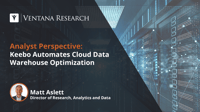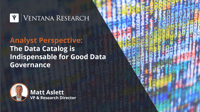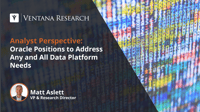In recent years, many enterprises have migrated data platform workloads from on-premises infrastructure to cloud environments, attracted by the promised benefits of greater agility and lower costs. The scale of cloud data platform adoption is illustrated by Ventana Research’s Data Lakes Dynamic Insights research: For two-thirds (66%) of participants, the primary data platform used for analytics is cloud based. As the quantity and importance of the data platform workloads deployed in the cloud...
Read More
Topics:
business intelligence,
Cloud Computing,
data operations,
robotic automation,
Analytics & Data,
Analytic Data Platforms,
AI and Machine Learning
In today’s organization, the myriad of analytics and permutations of dashboards challenge workers’ ability to take contextual actions efficiently. Unfortunately, conventional wisdom for investing in analytics does not recognize the benefits of empowering the workforce to understand the situation, examine options and work together to make the best possible decision.
Read More
Topics:
business intelligence,
Analytics,
Data,
Digital Technology,
Digital Business,
AI & Machine Learning,
Analytics & Data,
Analytic Data Platforms
The data catalog has become an integral component of organizational data strategies over the past decade, serving as a conduit for good data governance and facilitating self-service analytics initiatives. The data catalog has become so important, in fact, that it is easy to forget that just 10 years ago it did not exist in terms of a standalone product category. Metadata-based data management functionality has had a role to play within products for data governance and business intelligence for...
Read More
Topics:
business intelligence,
Data Governance,
Data Management,
Data,
data operations,
Analytics & Data
I recently wrote about the growing range of use cases for which NoSQL databases can be considered, given increased breadth and depth of functionality available from providers of the various non-relational data platforms. As I noted, one category of NoSQL databases — graph databases — are inherently suitable for use cases that rely on relationships, such as social media, fraud detection and recommendation engines, since the graph data model represents the entities and values and also the...
Read More
Topics:
business intelligence,
Analytics,
Cloud Computing,
Data,
Digital Technology,
AI & Machine Learning,
data platforms,
Analytics & Data
I previously explained how the data lakehouse is one of two primary approaches being adopted to deliver what I have called a hydroanalytic data platform. Hydroanalytics involves the combination of data warehouse and data lake functionality to enable and accelerate analysis of data in cloud storage services. The term data lakehouse has been rapidly adopted by several vendors in recent years to describe an environment in which data warehousing functionality is integrated into the data lake...
Read More
Topics:
business intelligence,
Analytics,
Data,
data lakes,
data platforms
Despite all the advances organizations have made with respect to analytics, our most recent research shows the majority of the workforce in the majority of organizations are not using analytics and business intelligence (BI). Less than one-quarter (23%) report that one-half or more of their workforce is using analytics and BI. This is a problem. It means organizations are not enabling their workforce to perform at peak efficiency and effectiveness. It means the workforce in many organizations...
Read More
Topics:
Sales,
business intelligence,
embedded analytics,
Analytics,
Data,
Sales Performance Management,
Digital Technology,
Digital Commerce,
natural language processing,
Subscription Management,
partner management,
Revenue Management,
Sales Engagement,
Collaborative & Conversational Computing
As I noted when joining Ventana Research, the range of options faced by organizations in relation to data processing and analytics can be bewildering. When it comes to data platforms, however, there is one fundamental consideration that comes before all others: Is the workload primarily operational or analytic? Although most database products can be used for operational or analytic workloads, the market has been segmented between products targeting operational workloads, and those targeting...
Read More
Topics:
business intelligence,
Analytics,
Data,
data lakes,
data operations,
AI & Machine Learning,
data platforms
Organizations have become more agile and responsive, in part, as a result of being more agile with their information technology. Adopting a DevOps approach to application deployment has allowed organizations to deploy new and revised applications more quickly. DataOps is enabling organizations to be more agile in their data processes. As organizations are embracing artificial intelligence (AI) and machine learning (ML), they are recognizing the need to adopt MLOps. The same desire for agility...
Read More
Topics:
business intelligence,
Analytics,
Data Governance,
Data,
Digital Technology,
data operations,
data platforms
Sisu Data is an analytics platform for structured data that uses machine learning and statistical analysis to automatically monitor changes in data sets and surface explanations. It can prioritize facts based on their impact and provide a detailed, interpretable context to refine and support conclusions. The product features fact boards, annotations and the ability to share facts and analysis across teams. Data teams and analysts start by creating common definitions of key performance...
Read More
Topics:
business intelligence,
embedded analytics,
Analytics,
Collaboration,
Data,
AI & Machine Learning


















